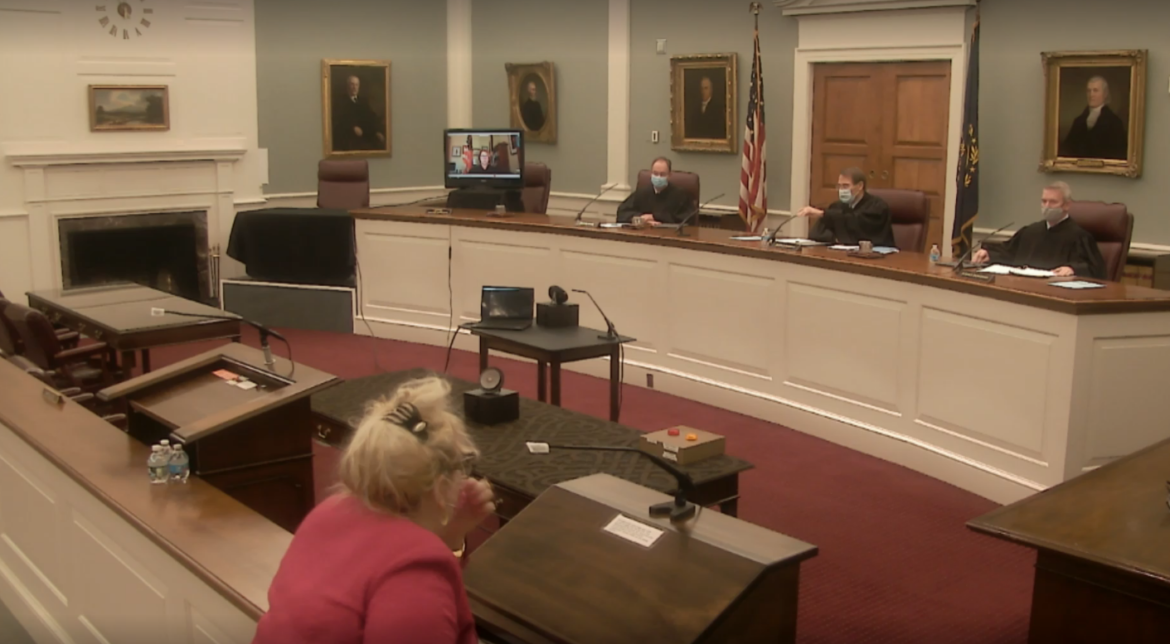By NANCY WEST, InDepthNH.org
CONCORD – The state Supreme Court heard arguments Thursday seeking an advisory opinion on whether the House of Representatives can meet remotely instead of at the State House because of the pandemic.
House Clerk Paul C. Smith specifically asked the court in a letter dated Sept. 17: “Would holding a session of the New Hampshire House of Representatives remotely either wholly or in part whereby a quorum could be determined electronically violate Part II, Article 20 of the New Hampshire Constitution?”
Attorney Penny S. Dean, argued on behalf of Joseph A. Hoell Jr., saying it would be unconstitutional, but attorney Paul Twomey, former House legal counsel, argued that it would not be.
Twomey told the justices that the case boiled down to one word in Part II, Article 20: “The question before you is what does the word present mean in Article 20? Other parties have parsed that word to death,” Twomey said.
It is not enough to go to a dictionary to determine its meaning, but instead he asked the justices to take into consideration the purpose and intent of the provision, looking into the New Hampshire Constitution as a whole.
If the definition of the word ended up keeping the House from meeting, “I would suggest you’d be turning the Constitution on its head…” Twomey said.
Twomey ended his argument saying, “Think about what present means – It means to be able to hear, to be able to speak and to be able to mostly, to vote.”
Attorney Dean detailed what the public would miss without being able to attend the House sessions by sitting in the gallery in Representatives Hall at the State House. What people would see if they have a 50-inch television screen, which she said most people can’t afford, would be a passport sized photo of the representatives in a “two-inch square or one-inch square on a screen.”
The public wouldn’t be able to see if the representatives were chatting with others or texting online before voting, she said.
One justice asked Dean, “… the House is free to make its own rules, right? We can’t infringe on that process, can we?”
Dean responded, “You can’t infringe upon the rules, but they have to follow the Constitution. They absolutely can make their own rules about many things but the Constitution is very clear and as outlined in our memorandum we go through the specific places that the Constitution talks about – attendance and accessibility, quorum and meeting in a place and all of those words have meaning…”
Dean said the state Supreme Court can’t make rules that the House starts sessions at 8 a.m. or 9 a.m., what she called ministerial rules.
“But this is a substantive rule and it’s so important that the Constitution outlines it in several places. What’s more important you have to look at all the articles in the Constitution as we’ve outlined in our memoranda and supplement. You cannot look at one part,” Dean said. That would be like interpreting a case based on one section of a statute, she said.
Dean said representatives could be texting, making calls and interacting with others while attending remotely in ways the public couldn’t see.
Associate Justice Anna Barbara Hantz Marconi asked: “The public is limited to the gallery and so isn’t that itself a restriction that really practically speaking prevents the public from listening in on every phone call, seeing every note that’s passed? So, isn’t a virtual presentation somewhat the same as being limited to the gallery?”
Dean responded: “Absolutely not.” Even on the rare occasion that the gallery is full, Dean said the public can still observe or the press can observe for them through their cameras what is happening. She gave the example that Associate Justice Marconi, who heard arguments remotely appearing on a television screen, with the other three justices in person at the state Supreme Court in Concord, could be texting out of camera shot.
“I’m not suggesting you are,” Dean said. But given the state has 400 representatives even with a 50-inch television screen, the viewing public would at best see a headshot of their elected representative, she said. Dean also said not everyone has access to the Internet in New Hampshire and some can’t afford the Internet if they do have access.
Senior Associate Justice Gary Hicks, and Associate Justices James Bassett and Patrick Donovan also heard the arguments and are expected to make a decision at a later date.
A memorandum of law filed by state Rep. Renny Cushing, D-Hampton, and former state Rep. Mindi Messmer, outlined how the 400-member House was forced to stop meeting in mid-March because of the pandemic.
While ultimately a small number of bills were able to be fully enacted in three special sessions that took place in the Whittemore Center at UNH, much of the legislative work was simply left undone, the memorandum stated.
It also went on to discuss how federal CARES ACT funds were received and expended by Gov. Chris Sununu without legislative oversight.
“The resulting diminution of democracy was reluctantly accepted by the legislative leaders who no doubt hoped that the crisis would be resolved before the next legislature was to convene in December of 2020. Sadly, it now appears impossible for the foreseeable future for the legislature to meet in the State Capitol,” the Cushing/Messmer memo stated.
Correction: An earlier version misstated who Attorney Penny Dean represented. Dean represented Joseph A. Hoell Jr.





